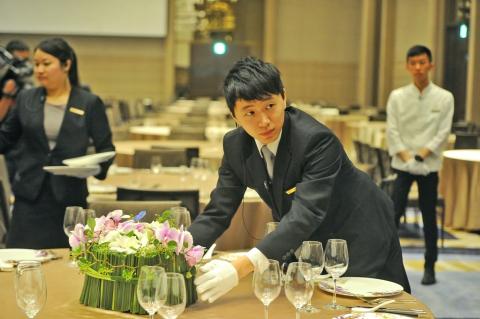Nearly 700 heads of states, diplomats and foreign dignitaries from 59 countries around the world are to attend president-elect Tsai Ing-wen’s (蔡英文) inauguration today, the Ministry of Foreign Affairs said yesterday.
At a routine news conference yesterday morning, ministry spokeswoman Eleanor Wang (王珮玲) said the 59 include Taiwan’s 22 diplomatic allies and 37 that do not have formal ties with Taipei.
“From my understanding, the number of foreign dignitaries attending Tsai’s inauguration ceremony surpasses those in previous years,” Wang said.

Photo: CNA
She said the invitation process this year went “very smoothly.”
The ministry said the US delegation is to be led by former US trade representative Ron Kirk, who is to be accompanied by former US deputy secretary of state John Negroponte, former US Department of State deputy spokesman Alan Romberg, American Institute in Taiwan (AIT) Chairman Raymond Burghardt and AIT Director Kin Moy.
The Holy See — the nation’s only European diplomatic ally — is sticking with precedent and sending its Apostolic Nuncio to Japan, Archbishop Joseph Chennoth.

Photo: CNA
Chennoth and Vatican’s charge d’affaires ad interim to Taiwan, Monsignor Sladan Cosic, are also to attend Tsai’s state banquet tonight at Taipei’s Marriott Hotel.
Eighteen delegations from other European nations, including the UK, France, Germany, Italy, Austria, Denmark, Ireland, Slovakia and Hungary, have arrived for a total of 48 people.
One delegation, led by European Parliament-Taiwan Friendship Group vice chairman Dominique Riquet, includes former Dutch prime minister Andreas van Agt, former Slovakian prime minister Iveta Radicova and All-Party Parliamentary British-Taiwanese Group co-chairman Lord Faulkner of Worcester.
As for Japan, a delegation of 252 people arrived in Taipei on Wednesday, including Interchange Association, Japan President Tadashi Imai, as well as chief executive and vice chairman of the Japan-Republic of China (ROC) Diet Members’ Consultative Council, Furuya Keiji and Eto Seishiro.
The leaders of Taiwan’s six Asia-Pacific allies are attending: Marshallese President Hilda Heine, Nauruan President Baron Waqa, Tuvaluan Prime Minister Enele Sosene Sopoaga, Palauan President Tommy Remengesau, Solomon Islands Governor General Frank Ofagioro Kabui and Kiribati President Taneti Maamau.
Other Asian-Pacific states, including South Korea, Australia, Indonesia, the Philippines, Singapore and India, have all sent delegates to the event.
Leaders and high-level officials of the nation’s diplomatic allies in Africa, Latin America and the Caribbean will also attend the ceremony, including Swazi King Mswati III, Burkinabe Prime Minister Paul Kaba Thieba, Sao Tomean Minister of Foreign Affairs Manuel Salvador dos Ramos, Paraguayan President Horacio Cartes, Saint Kitts and Nevis Prime Minister Timothy Harris, Nicaraguan Vice President Moises Omar Halleslevens Acevedo, as well as the deputy prime ministers of Belize and Saint Vincent, and the legislative speaker of Saint Lucian.
Honduran President Juan Orlando Hernandez is not able to attend Tsai’s inauguration ceremony as planned due to “internal affairs.”
Instead, he has sent Honduran Supreme Court President Rolando Edgardo Argueta Perez, said Miguel Tsao (曹立傑), director-general of the ministry’s Department of Latin American and Caribbean Affairs.

MAKING WAVES: China’s maritime militia could become a nontraditional threat in war, clogging up shipping lanes to prevent US or Japanese intervention, a report said About 1,900 Chinese ships flying flags of convenience and fishing vessels that participated in China’s military exercises around Taiwan last month and in January last year have been listed for monitoring, Coast Guard Administration (CGA) Deputy Director-General Hsieh Ching-chin (謝慶欽) said yesterday. Following amendments to the Commercial Port Act (商港法) and the Law of Ships (船舶法) last month, the CGA can designate possible berthing areas or deny ports of call for vessels suspected of loitering around areas where undersea cables can be accessed, Oceans Affairs Council Minister Kuan Bi-ling (管碧玲) said. The list of suspected ships, originally 300, had risen to about

DAREDEVIL: Honnold said it had always been a dream of his to climb Taipei 101, while a Netflix producer said the skyscraper was ‘a real icon of this country’ US climber Alex Honnold yesterday took on Taiwan’s tallest building, becoming the first person to scale Taipei 101 without a rope, harness or safety net. Hundreds of spectators gathered at the base of the 101-story skyscraper to watch Honnold, 40, embark on his daredevil feat, which was also broadcast live on Netflix. Dressed in a red T-shirt and yellow custom-made climbing shoes, Honnold swiftly moved up the southeast face of the glass and steel building. At one point, he stepped onto a platform midway up to wave down at fans and onlookers who were taking photos. People watching from inside

Japan’s strategic alliance with the US would collapse if Tokyo were to turn away from a conflict in Taiwan, Japanese Prime Minister Sanae Takaichi said yesterday, but distanced herself from previous comments that suggested a possible military response in such an event. Takaichi expressed her latest views on a nationally broadcast TV program late on Monday, where an opposition party leader criticized her for igniting tensions with China with the earlier remarks. Ties between Japan and China have sunk to the worst level in years after Takaichi said in November that a hypothetical Chinese attack on Taiwan could bring about a Japanese

The WHO ignored early COVID-19 warnings from Taiwan, US Deputy Secretary of Health and Human Services Jim O’Neill said on Friday, as part of justification for Washington withdrawing from the global health body. US Secretary of State Marco Rubio on Thursday said that the US was pulling out of the UN agency, as it failed to fulfill its responsibilities during the COVID-19 pandemic. The WHO “ignored early COVID warnings from Taiwan in 2019 by pretending Taiwan did not exist, O’Neill wrote on X on Friday, Taiwan time. “It ignored rigorous science and promoted lockdowns.” The US will “continue international coordination on infectious